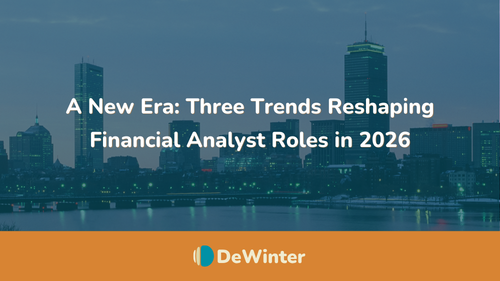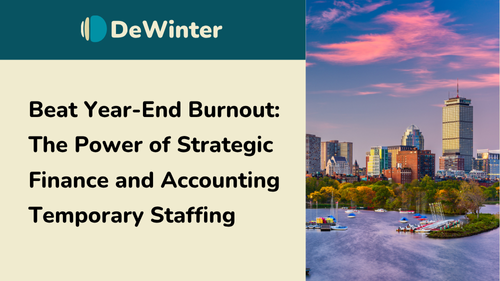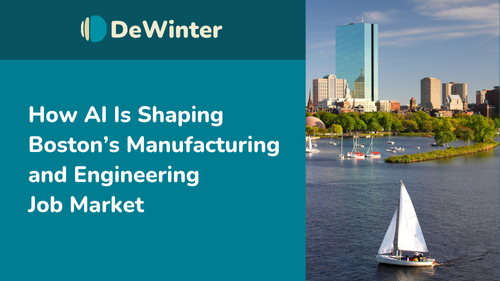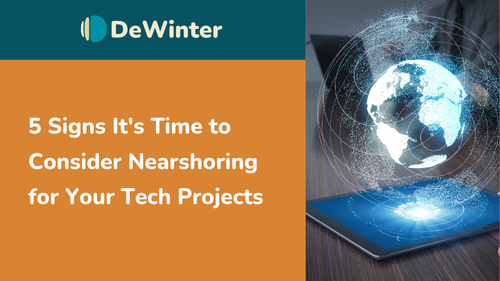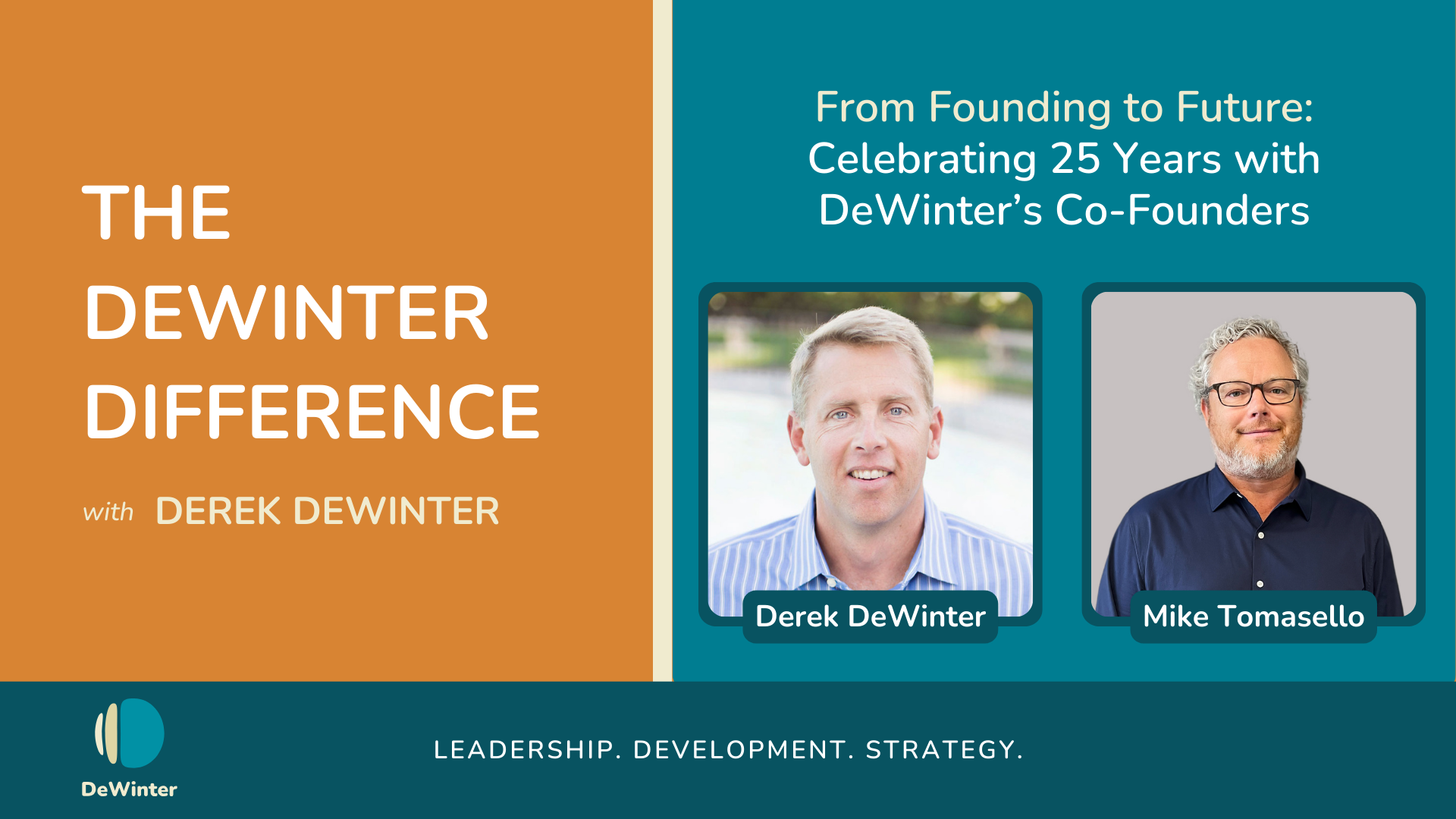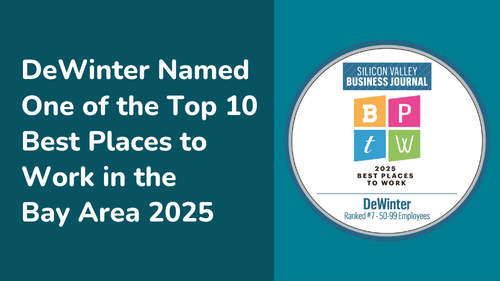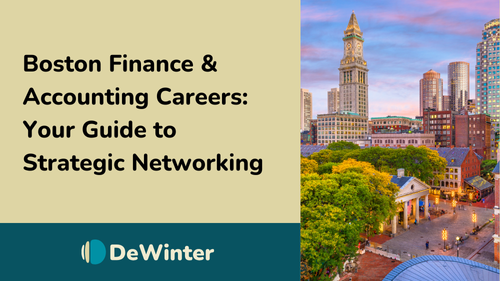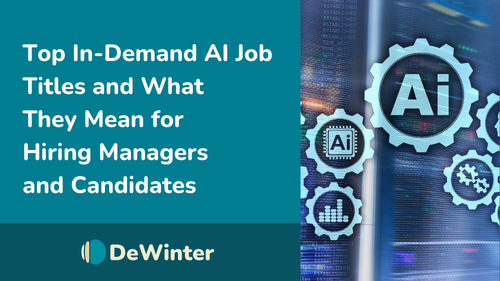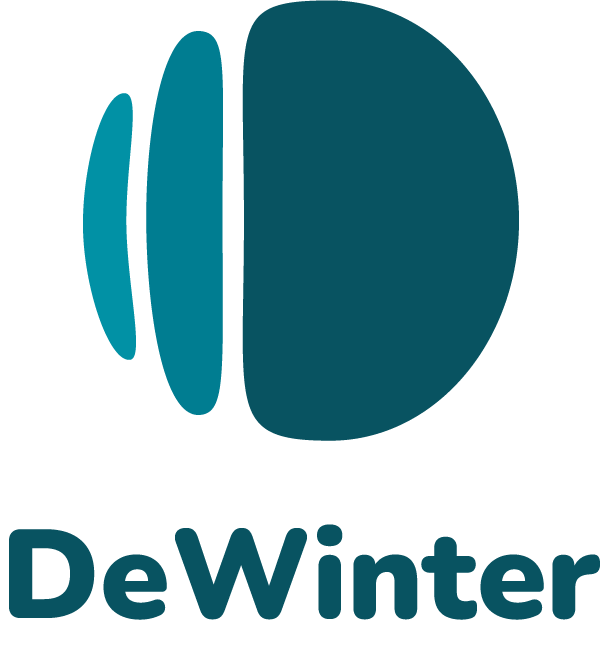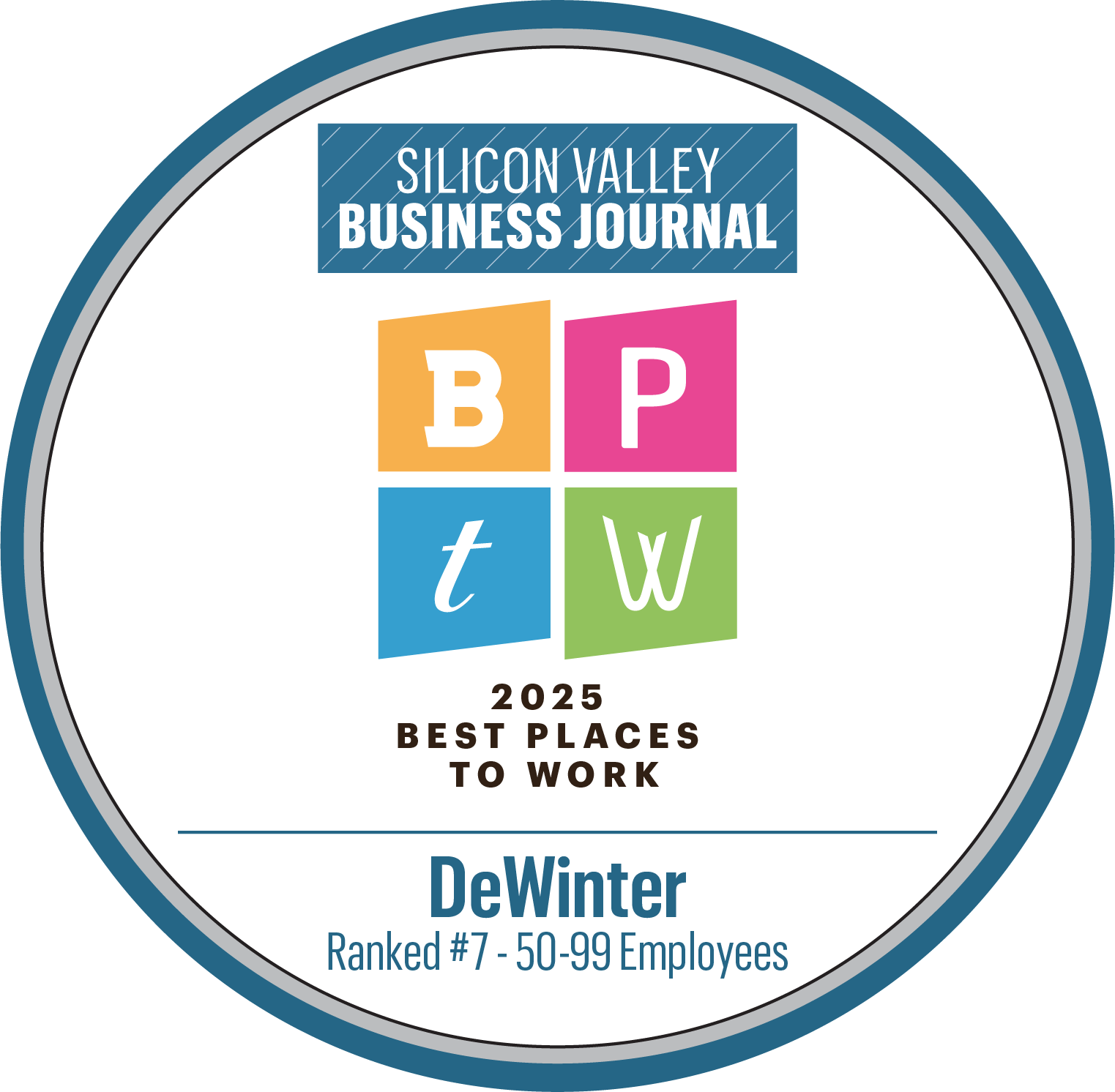The DeWinter Difference: Carin Taylor, Chief Diversity Officer at Workday
About The Episode
In this episode of the DeWinter Difference, Derek sits down with Adriel Lares, Chief Financial Officer of Stash. Adriel and Derek discuss the evolving role of today's CFOs, the impact of AI, finding the balance between in-person and remote interactions, and their shared love of making wine with friends.
Check out Memento Mori, Adriel's California-based winery at
www.mmwine.com.
Listen now at the streaming sites listed.
Learn more about the DeWinter Difference podcast here and share your thoughts and comments below.
Episode Transcript
This transcript has been edited for length and clarity.
Derek DeWinter: Welcome to our listeners who are tuning into the DeWinter Difference, an audio podcast where I spend a bit of time with incredible executives I've known for years, and you get to listen in. I hope that our conversations are unique, insightful, and short enough to hold your attention, but long enough so that you get some great takeaways that you can apply in your career, life, and relationships.
Today I'm very pleased to speak with my friend Carin Taylor, Chief Diversity Officer at Workday. Prior to Workday, Carin led global diversity, equity, and inclusion teams at Genentech and Cisco and as she has done throughout her distinguished career, she gives even more of herself supporting organizations that further the advancement of women leaders in our communities and corporations.
I absolutely adore my friend Carin, and respect her immensely as a person and a professional. However, I will share with you that of the thousands of interviews I've done in my career, my very first meeting with Carin did scare the heck outta me just a little bit. Carin, thanks for joining us today. And do you remember our first meeting?
Carin Taylor: Hey Derek, good to be speaking with you. I do remember our first meeting, but I don't know why it scared you so bad.
Derek DeWinter: I wanted to impress you probably more than I've wanted to impress a lot of people in my life. I'm not gonna lie so yeah, it made me a little nervous.
Carin Taylor: That's hilarious. Well, I remember the meeting being a fantastic meeting and I remembered meeting you thinking, ah, what a wonderful person. I hope I get to work with him a bit more So I hope I'm less scary than I was back then.
Derek DeWinter: It was a me problem for sure, but I did, I mean, I, I certainly wanted to impress you quite a bit. We were advancing the board for Watermark, a board that we both served on for a few years. And I really, really wanted you on the board desperately. So I definitely wanted to make a good impression.
Carin Taylor: Well, you did your job because I actually joined the board, so even better yet.
Derek DeWinter: There you go. Alright, so I've got a few questions for you. The first is probably the most complicated one. So let's pretend you have a hundred dollars in your pocket.
To purchase attributes that you believe have made you a successful executive that you can't live without. And the more you spend on a specific attribute, the less you can spend on others. For instance, if I believe that intelligence is the single important attribute I possess, which is I can hear noise in the background as if there was laughing that has helped me get to where I am.
I might spend $80 on that and $20 on other attributes, but you only have a hundred dollars. So where would you start allocating your money?
Carin Taylor: Oh, it's such a good question. I'm not sure how I would allocate it across all the different attributes, but I would imagine that close to a hundred percent would be directed toward attributes that make the world a better place. So for me, it would be things like empathy and cultural intelligence and being open-minded in things like humility, and curiosity and compassion, and courage.
So as much as you know, strategy and communications and those types of things are all needed, I'd probably lean on things that I think would make us a better world.
Derek DeWinter: It's as good of an answer as I could possibly think of. What is in the news in the market a whole lot lately is AI and you can't kind of, you can't do anything without hearing about it one way or the other. As it relates to the role of a diversity officer, are you more concerned or more excited about the impact on the way you do your job going forward?
Carin Taylor:
Yeah, it's a great question. And I would say probably a little bit of both. You know, I'm excited about the opportunities that AI will bring to the world. And so if I think about things like diversity reporting as an example AI is gonna help out tremendously. So just imagine that I need a report, it's on some demographics, and let's assume I need a report on, let's just say the number of Asian women who have been promoted in the last five years from North America, Europe, and Asia, and I'd like to understand what leadership skills have been most beneficial for that person within years one and five. That would be a very complicated report for me to get today. AI is going to be able to give me that information literally in seconds.
And so for those types of reasons, I'm excited about AI. But on the other hand, I'm also a little bit concerned. So, you know, most of my concerns really have to do about, honestly, Derek, the efficacy of people and how humans may misuse AI and so I'm, I'm more so worried about the unintentional consequences of AI and people just not using it in the right way, or us not thinking long enough downstream to really understand the, the true impacts that are going to come from AI.
And so those are the kinds of things that I'm worried about ethical AI practices and consistency across the world on how AI should be used for good, I think this is really important because as we both know, AI will be used in a negative, in a bad way as well.
And I think we just have to be aware of that and that we have to mitigate. Some of the bad behavior as much as we can, but honestly, I'm pretty cautiously optimistic about what's to come with AI.
Derek DeWinter: Excellent. What would you tell your younger self about how we've done in the last 25 years in corporate America as it relates to developing diverse organizations and, in sharing your thoughts with your younger self? Would she the young, you be surprised to know we've come this far or would she be disappointed we've not made even further strides?
Carin Taylor: Hmm. God, it's such a good question. So I would probably tell myself probably three things. The first thing would be I told you this would be a long, hard fight and it has been. But honestly, I would also say that every moment of pain has been worth the advancement. Whether or not that advancement has been big or small, the amount of effort that we actually put into this work is really important.
And it feels often like we are not making a ton of progress. But if I reflect on how this conversation has really shifted from being really just about women, you know, 20 years ago and trying to get women into leadership and more women into our companies, to today where we're talking about things like Belonging for all, I think the conversation has certainly changed and, and I'm excited about that.
I think the next thing is, I'd probably say, you know, we've made some impressive strides, and although it may not always feel like that we have to celebrate the wins along the way because as I mentioned, all of those wins become extremely important. But like I said, you tend to forget all the accomplishments that have been made because, the work can really be daunting.
And then I think the third thing is honestly, we have a lot more work to do. And the best way that we can do it, honestly, is together. So there are a lot of people out there who are doing work in the DEI space of all shades and, and colors and walks of life. But as I think about where I do my best work, Derek, it's in having conversations like this with people like you who and people who are you know, a similar thought track as we think about what is it gonna take to make this world a better place for all people. And so there's a lot of progress that we've made. I'm excited about it. yeah, there's still a lot more that we need to do as a society.
And like I said, we can, we can definitely do this work together, but a lot to do.
Derek DeWinter: It's interesting. We've talked about this a lot over the course of the years we've known one another, and these are hard questions to step into but they don't seem so hard after you've had the conversations. The hard part then is the work to, you know, To make things better and to understand one another more, but sometimes that very first step is one you don't take because you're so nervous about the things you might say or, or the wrong things you might do.
But, if you don't take that first step, you don't get anywhere.
Carin Taylor: I, you are so right, and right now, today, one of the things that I think is really polarizing in our country right now is honestly the fact that we will not listen and talk to each other anymore. Right? It doesn't really matter what side of the spectrum you are on. On any topic today, we've gotten to a point to where we, we are at an impasse and we will, we refuse to hear one another and I think the more we can just let down the blinders and hear the other side and, and it's not to move you over to the other side or make you think like, I think it really is about us having the opportunity.
To learn more from each other and understand one another so we can move forward together with that understanding.
Derek DeWinter: So that was a question that's really related to kind of corporate America, how far we may or may not have come and over the course of the past 25 years. But you have exposure to teams that are outside the United States certainly outside of the Bay Area, nationally and internationally. How would you characterize or kind of compare the approach to equity inclusion in those regions or areas of the world?
Carin Taylor: Yeah, it's such a good question. You know, as I've been doing this work over the last, you know, 20 or so years, what I have found is that DEI is different around the world because our demographics are different around the world and what I find is that we focus on what's closest to us. So if I think about North America as an example, we focus a lot on gender and race or, ethnicity, but we're also focused on things like disability and caregivers.
We saw through the pandemic this notion of really being focused on caregivers, both for those who are caring for the young and the elderly, is a real pocket of concern for us as a nation and so that's an area that we are focused on.
But if I look across Europe part-time work is something that they focus on a lot.
People with disabilities, how do they get more women into leadership? All of those things are important, but here's what I'll tell you. Even with all the nuances I have found that there is some common ground and it is this notion of belonging and so regardless of your location or your demographics, ensuring that people feel like they belong has really been the common thread.
As companies and countries are continuing to move forward. And so there's something that just keeps bringing us back to this notion of belonging and that I think is extremely interesting.
And at the end of the day, you look, people wanna work for a workplace where. They feel welcomed, like they feel heard, like they feel appreciated.
And so the more I hear from Chief Diversity Officers and Chief People Officers and CEOs, they're honing in on this notion of belonging. A lot of times, you know, Derek, we often talk about, well, what is belonging? One of the things I have been working on is identifying what is belonging and how does that show up?
And I've been looking at it through this lens of peace, and I'll share that with you really quickly.
And so I did a little bit of research around like, what is it that makes me feel like I belong? It was these five tenets, psychological safety, empathy, acceptance, connection, and feeling embraced.
And when you put those together and those things spell out PEACE, those are the things that make someone like me feel like I belong.
And so I think there is something true in this notion of wanting to bring out the goodness in people through this lens of peace or belonging.
Derek DeWinter: Hmm. That's pretty awesome. We actually just did a video DEI and B, belonging, exercise today in our company, ironically.
And so I see the word belonging, you know, as something that has been being really highlighted today or more recently than I have seen it in the months prior to this.
So it's another additional piece of the entire puzzle, right?
Carin Taylor: Yeah, both belong. And then the other word that comes up a lot is equity, right? How do we just not make people feel like they belong, but how do we make everybody feel like they belong? And how do we make sure that we're creating an equitable experience for everyone?
Derek DeWinter: Well, you are such a thoughtful and interesting person. So what would you be doing if you weren't in a senior leadership HR diversity role like you're in now?
Derek DeWinter: It could be anything. It can be anything.
Carin Taylor: Literally anything, it would be one of two things. I would either be a talk show host because I love sitting on the other side like you and asking questions like this, or, I would be an actress. And then if you were to ask me this question, like in the last probably three or four years, I might even be a professional pickleball player.
Derek DeWinter: I love that. Oh, awesome. Speaking of an actress, have you seen the Barbie movie?
Carin Taylor: I did. I did.
Derek DeWinter: Did you like it?
Carin Taylor: I did.
Derek DeWinter: Okay. What is the thing you like the most and the least out of the movie? And I saw it too, by the way.
Carin Taylor: So the thing I like the most, honestly, was that you were either called Ken or Barbie. I thought that that was such a great way to talk about diversity. And so that I definitely loved it and there wasn't anything that I really didn't like about it, what I did.
What I enjoyed is it really, it was a movie from my genre and was really talking about things that I had forgotten about in some cases as well.
And so, I enjoyed it. I've spoken to a lot of people who have either loved it or they've hated it, but I enjoyed it.
Derek DeWinter: Oh, I thought it was, I thought it was great. My wife was definitely like, hitting my arm going, oh my God, I had that. Oh my God, I did that. Either. I remember the pool, I remember this. All those kinds of things.
I tell you what, you've been on the receiving end of a lot of questions from me, so I get to throw this is not a safe move on my part at all by letting you ask a final question and I don't know what it is of me.
So I'll let you have the stage for your talk show host endeavors.
Carin Taylor: Awesome. Thank you so much. Thank you for joining me today, Derek. My first question for you is, why should everyone, including cisgender white men like yourself, care about DEI? What's really in it for them? How would you articulate that?
Derek DeWinter: Well, that's an easy question to answer, of course. Wow, that's a big one. I think, you know, I view the world in a sense of like, there should be a place, and you used the word peace earlier. There should be a safe place for everyone to exist, live, and share questions, answers, and thoughts, and if I don't provide an opportunity for those around me to be in a safe place, then I am not doing a very good job of making whatever is around me, whether it's my house or my community, or my workplace or the world greater.
I'm not doing my best to make it a better place and so, you know, I tend to think about this a lot more as I get older. I suppose I probably didn't think of this way when I was 20 or 30, or certainly even younger, but as I get older, I should be doing more because it's simply the right thing to do for those around me. And a byproduct of that is that it’s a better thing for me too. I get more authentic, real connections with people, and if I'm not doing my part, then I don't get those. Maybe it's a selfish move I get a little bit too, but like I love authenticity and conversation and relationships and if you're not creating a platform for that and the things that you do and say, then I think it's kind of a big shame on you.
Carin Taylor: I love that. Thank you. And that was unscripted, so I appreciate you answering so authentically.
Derek DeWinter: Well, You and I go back, you know, a few years and and I absolutely appreciate you joining us. I wanna thank you again for making the time and for listening to it is very worth recognizing that in addition to Carin's very important day job, she is a highly sought-after speaker, facilitator, and leadership coach on diversity, equity, inclusion, and belonging.
And if you wanna hear more from her, you should reach out. Directly or indirectly to the people around her, that's uh, all the more important thing to bring up because it's a special thing for us to have you today.
And Carin, I thank you so much for joining us. And on a personal note, I thank you so much for your friendship over the years. It means a lot.
Carin Taylor: Thank you so much, Derek. This has been a pleasure. I was so happy to be here with you today. Appreciate you.
Derek DeWinter:
Be well. Thank you. Bye-bye.
Carin Taylor: Thank you.

